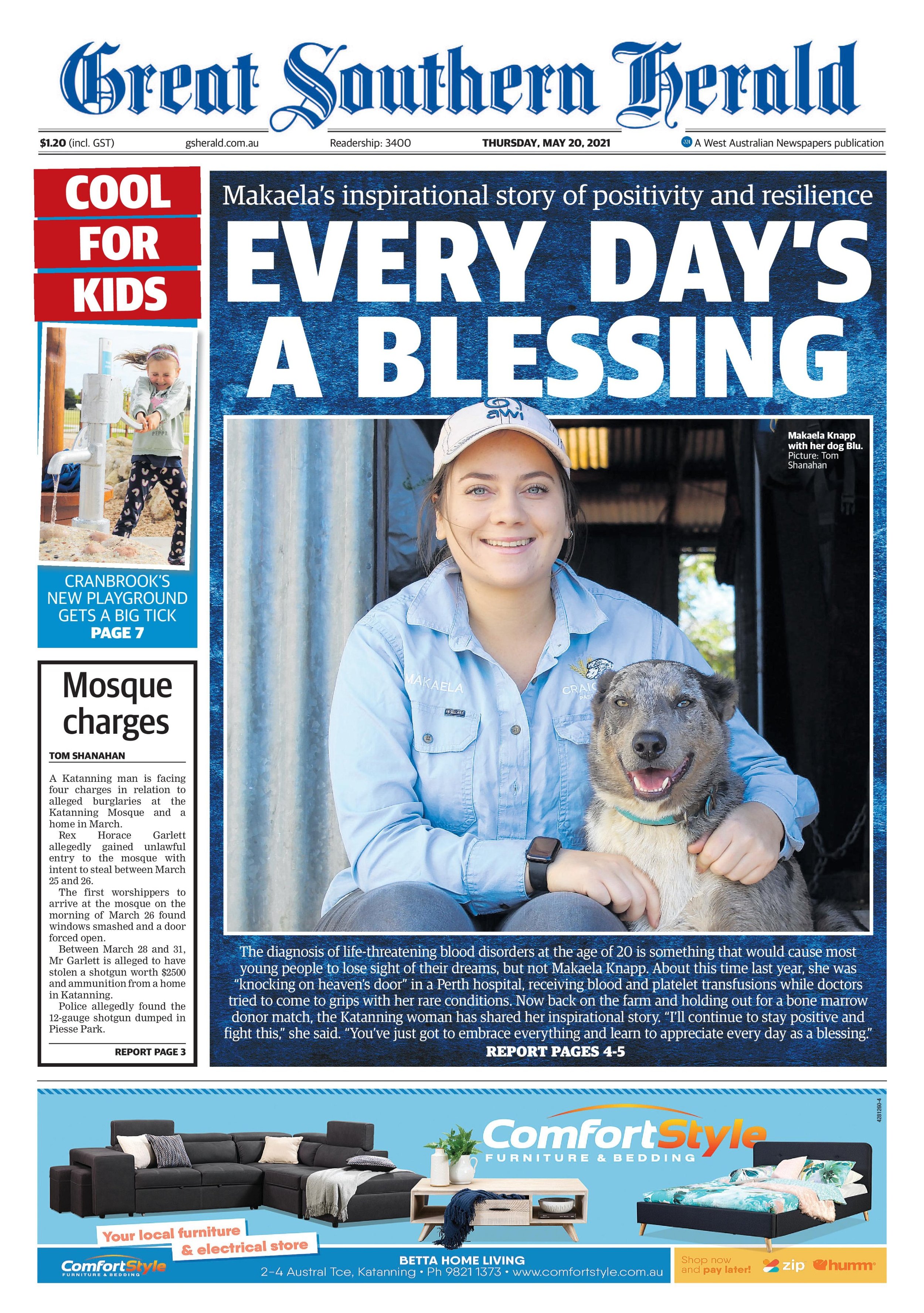Every day’s a blessing for young Katanning farmer
Makaela Knapp has shared her inspirational story. Credit: Tom Shanahan
The diagnosis of life-threatening blood disorders at the age of 20 is something that could cause some young people to lose sight of their dreams, but not Makaela Knapp.
The Katanning “apprentice” farmer stood up at the 2021 Katanning Rotary International Dinner earlier this month and shared her incredible journey to raise awareness of blood and bone marrow donation.
She received a standing ovation after a moving speech.
“This time last year I was extremely sick. I downplay it a lot, but I was knocking on heaven’s door,” she said.
“By sharing my story, I hope to make a difference — even if it’s little.”
The speech came 372 days after Ms Knapp received her life-changing rare diagnosis of aplastic anaemia and paroxysmal nocturnal haemoglobinuria — diseases which slow the production of blood cells or destroy them altogether.
It was April 2020 and she was a healthy young farmer who was studying international relations and sheep and wool science at Curtin University.
She realised something was not quite right when she started feeling nauseous during her usual weekend work around the farm.
“I was trying to pull some lambs out of a dam and felt quite nauseous and felt like fainting, which is not me at all,” she said.
“On the Monday, the slight abdominal pain I had got, got worse and worse throughout the day.
“That night I didn’t sleep — the pain kept me up.
“Wednesday comes around, I’m out fencing and I just couldn’t deal with the pain anymore, so I called the GP and thankfully got an appointment that day.
“The pain got that bad by 9pm that night my mum took me into emergency.”
Ms Knapp was put on IV hydration before being sent to Hollywood Hospital the next day for a CT scan that showed multiple lesions in her small intestine.
She said her haematologist told her “in the nicest way possible” her symptoms appeared to be a form of blood cancer, so she underwent numerous blood tests and a bone marrow biopsy while in agony from her abdominal pain.
While she waited for her results, she had blood and platelet infusions and went in for an endoscopy which showed her small intestine was dying in two places because of blood clots.
“Finally, an answer to why I was in so much pain,” she said.
Ms Knapp was diagnosed with the extremely rare blood disorder PNH, and only one week later she was also diagnosed with aplastic anaemia.
Doctors put Ms Knapp on eculizumab, a medication that costs $500,000 per patient per year.
In Australia, eculizumab is paid for under the Federal Government’s Life Saving Drug Program.
“That’s when my fight really started — I was prepared that I might not make it through the night,” she said.
“Only last week, when it was a year since I was diagnosed, I thought to myself, ‘I can’t quite believe I am here and I survived that night’.”
The 21-year-old makes regular trips to Perth for treatment. Credit: Supplied
PNH can go undiagnosed in patients for years, which is why Ms Knapp described her diagnosis and care as “groundbreaking”.
“I was surviving off daily blood and platelet infusions for a few weeks. Later it became weekly, then fortnightly and now for a while months between.” she said.
“I am currently managing my disorders with daily medication and fortnightly intravenous infusions at Charlie’s (Sir Charles Gairdner Hospital) Cancer Centre, where the dedicated and extremely caring nurses have become my second family.”
While battling her conditions, Ms Knapp caught up on missed work and completed the second year of her degree.
Though her treatment was complex, with multiple trips to Perth per month just to manage the disorders, she said her life was “still pretty bloody fantastic”.
“I might not be your normal now 21-year-old, but mate, am I happy,” she said,
“I wholeheartedly believe everything happens for a reason and every tough time serves a purpose — unfair and unfortunate things happen but you get to choose how you respond.”
“I’ll continue to stay positive and fight this with a can-do attitude, all whilst living by my motto, ‘one day at a time’.
“You’ve just got to embrace everything and learn to appreciate every day as a blessing.”
Ms Knapp has since been named on the new committee for AgConnect WA and is a rural ambassador of Wool Producers Australia.
She said medication was being used to manage her disorders, but medication did not work for everyone.
Makaela Knapp on the farm in Katanning Credit: Tom Shanahan
The only potential cure for such conditions is a bone marrow transplant.
“In my time in the hospital and cancer centre I have seen people first-hand in absolute desperate need of a transplant and blood,” she said.
“It is so very confronting and really sad to see.
“These people aren’t as fortunate as me, they don’t have the option to take medication or have exhausted those options, and a transplant is their only hope for survival.”
There are 39 million people on the International Bone Marrow registry, but Ms Knapp is without a match.
The inspirational Katanning woman is encouraging every eligible West Australia to donate blood and sign up to the bone marrow registry to give a “lifesaving gift” to those who need it.



